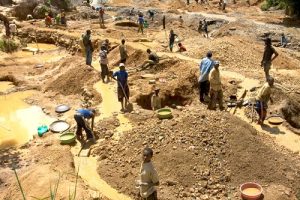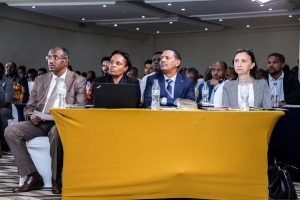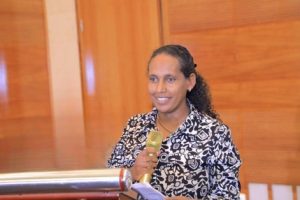
The African countries are exposed to climate change impacts. According to OCHA, at least 36.1 million people will be affected by severe drought in October 2022, including 24.1 million in Ethiopia, 7.8 million in Somalia and 4.2 million in Kenya.
This environmental phenomenon keeps Ethiopia always on the alert to take preemptive action rather than sitting ideal observing the recurrent drought which affected people in millions. Instead of observing what is going on in every other day, the country has been planting various kinds of seedlings devising an initiative called green legacy.
Accordingly over the past four years alone, the country has been planting more that 25 billion seedlings. The effort has not only changing the drought impact; it also shaped the perception of the people towards environment protection.
Carbon-trading deals involving forestry projects in developing countries could reduce poverty at the same time as they offer an inexpensive way to off-set carbon dioxide emissions. Under the clean development mechanism (CDM) of the Kyoto Protocol, industrialized nations are allowed to meet part of their carbon emission reduction commitments by carrying out reforestation and clean energy projects in developing countries.
Ethiopia aims to accomplish key economic goals while reducing GHG emissions through efforts that include carbon trading. It’s Climate- Resilient-Green- Economy Strategy (CRGE) launched in 2012 underpins the country’s goal to become net carbon neutral by 2025. Experts estimate that such an accomplishment would involve the country in doubling its forest cover to around 30 percent of its landmass which makes it a daunting task.
The Ethiopian government has adopted and commenced the implementation of a UN initiative called REDD+ [Reducing Emissions from Deforestation and forest Degradation, and (+) the role of sustainable management of forests, conservation and enhancement of forest carbon stocks in developing countries].
REDD+Ethiopia considers carbon trading as financial tool as well as one of the benefits of the efforts being made towards implementing CRGE. So REDD+ can be taken as one of the instruments of CRGE being used to address the problems that the forest sector is facing presently. A country of a large expanse of deforested lands and degraded lands suitable for forest restoration, Ethiopia has a huge potential for REDD+ implementation resulting in accumulation of huge quantity of Carbon Credits that can be monetized in the Carbon market.
Ethiopia is not a stranger to carbon trading, now it is trying to do it in huge scale by implementing REDD+. Carbon Trading afforestation projects are a feasible income earning opportunity for farmers in Africa to diversify their agricultural enterprises and to get the most out of ,if any, their underutilized lands. However making a project qualified to get Carbon Credit is not an easy ride.
The recent report indicated that Ethiopia can earn 500 million USD every year from carbon trading through the Green Legacy Initiative, National REDD+ Coordinator said. Ethiopia REDD+ Coordinator Yitebitu Moges told local media that carbon trading is a market-based system in which developed countries pay developing countries that develop forestry to absorb carbon and engage in development practices that reduce specific amounts of carbon.
In Ethiopia, 25 billion tree seedlings have been planted or 10 million hectares covered with seedlings over the past five years and 10 million of hectare, sequestering 5 tons of carbon dioxide every year, he said. “If you are able to find market that buys a ton of carbon dioxide with 10 USD, that means we have 500 million USD flowing to Ethiopia every year from the ten million hectares of forest that has been growing.”
Sequestering carbon by planting trees means growing money, the coordinator noted, adding that it should therefore be promoted like other sectors. According to him, there is high level support from the government in terms of planting trees and protecting forests, but the investment on experts in resources mobilization and carbon trading is limited.
Establishing a system for carbon accounting, measurement, monitoring, reporting and verification system is necessary, Yitebitu noted, adding that experts that are able to write monitoring report and invite people from abroad to validate and verify our numbers for carbon sequestration or emission reduction are also crucial.
In addition to carbon trading, he elaborated on the importance of tree seedlings in preventing soil erosion entering the Abay basin. With afforestation in the basin, soil erosion can be prevented and clean water will flow into the Grand Ethiopian Renaissance Dam supplying energy sustainably, he pointed out.
What happens in Ethiopia right now is the rain falls on deforested landscape and goes into the ocean as flood. During the dry season, there is shortage of water because the abundant water during the rainy season has not been caught. “The best instrument is forestry to really regulate this discrepancy so that you will have a smooth flow of water during the rainy as well as the dry seasons.”
The demand of timber is also very huge in Ethiopia and the country is paying 400 million USD every year to import finished furniture products, the coordinator noted. Timber planting is therefore needed in order to fulfill the demand for construction, industry and furniture.
In this regard, the coordinator emphasized that the Green Legacy Initiative is an exemplary work; and many countries know about it and their ambassadors participate in the tree planting in Ethiopia. The REDD+ Coordinator disclosed that Saudi Arabia and Kenya are replicating this strategy.
The National REDD+ Strategy (NRS) contributes a large part to the Climate Resilient Green Economy (CRGE) strategy and Ethiopia’s greening targets in 2030, while maximizing national co-benefits thereby adding to the global climate change mitigation efforts through improving forest resource and land management.
As carbon trading helps to build stronger relationships between nations and strengthens global efforts to address climate change, Ethiopia together with other African brothers and sisters should extend it massively and contribute something for the struggle against climate change.
BY GIRMACEHW GASHAW
THE ETHIOPIAN HERALD SUNDAY EDITION 3 SEPTEMBER 2023





